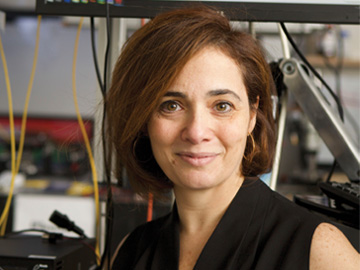
Early September brought some good news for international scientific collaboration. Specifically, the leaders of the United Kingdom and the European Union announced that they had struck an agreement to admit the UK as an associate member in the EU’s large Horizon Europe funding program. The UK’s participation in Horizon had been delayed for years by post-Brexit political squabbling. So the recent announcement was welcome—not only in easing joint EU–UK projects in optics and photonics, but more broadly in signaling the value of scientific cooperation across borders.
As someone who was raised and educated in Israel and Brazil before building a career in the United States, I came to my role as Optica President already sympathetic to the global dimensions of our science. Indeed, at the beginning of January, in my first message in this space, I noted that continuing Optica’s efforts to become an ever more international organization—with all of the benefits for members such a perspective brings—would be a key focus during my presidential term.
My commitment to that goal has only deepened in the months since then, as my Optica presidential responsibilities have included a fair amount of global travel and outreach. I have visited optics and photonics communities in areas ranging from Brazil to the Republic of Korea; trips later this year will take me to Japan, Australia, South Africa and perhaps elsewhere. In some of these countries, the optics communities are large and well established. In others, they are closer-knit and excited about opportunities to grow. All, however, share an understanding of optical and photonic science’s role in bringing the world together and in solving some of its most pressing challenges.
Mindful of this, Optica, as a global society, maintains a variety of formal international ties. One fine example is the Global Environmental Measurement and Monitoring (GEMM) Initiative (www.gemminitiative.org), a joint project of Optica and the American Geophysical Union that is bringing together a worldwide network of science, technology and policy stakeholders to improve environmental and climate change impact planning. On a different note, Optica also has long-standing connections and joint-meeting arrangements with regional societies, such as the Optical Society of Korea and the Japan Society of Applied Physics.
Less-formal connections, though, can be just as important—and eye-opening. In my message last month, for instance, I wrote about my visit to Brazil and how impressed I was with the enthusiasm and commitment of student chapters there. More recently, on a trip to the Republic of Korea, I had a different but no less impressive experience. During my time there, I attended a scientific conference geared to the local community and, thus, conducted entirely in Korean. Though I didn’t understand a word of the spoken language, the presentations dealt with science that I was interested in—and I was struck by how brightly the “universal language” of science shone through.
The global importance of our science makes it the responsibility of everyone in our community, whatever their home country, to reach across borders. I hope that everyone reading this message will actively seek out opportunities to do just that.
—Michal Lipson,
Optica President
View French, Spanish, Chinese, German, and Japanese translations of this message:
